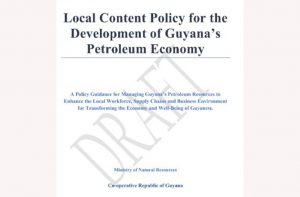— once Local Content Policy comes into force, says Jagdeo
ONCE the Local Content Policy is passed and fully implemented, it will prevent foreign companies from competing with locals operating within certain sectors. This is according to Vice- President, Dr. Bharrat Jagdeo, who said that, under the previous A Partnership for Unity + Alliance for Change (APNU+AFC) Government, foreign companies were “taking over almost every sector”. He said that, in its updated form, the Draft Local Content Policy provides more opportunities for growth and development for local companies. “There [are] some sectors that we are putting in the law, that you could only have Guyanese businesses competing against each other; there will be no foreigners to compete against,” the Vice-President said.
More specifically, he noted that areas such as landscaping, logistics, transportation, food supplies, cleaning services and rentals will all be reserved for only Guyanese investors and players.
In addition to the reserved sectors, Jagdeo said that Guyanese will also benefit from a guaranteed percentage of operation in almost all the other sectors. He said, too, that once the Local Content Policy becomes law, foreign companies operating in fields reserved for locals will have to “disengage”.

“… they would have to do something else, if they are here,” Jagdeo said. He explained too that the new law will also seek to define what is meant by ‘local companies’ so as to ensure that only Guyanese entities reap the intended benefits. Currently, the Draft Local Content Policy is in its consultation phases.
The document, as it is, includes a series of phased targets for improved local participation, benefits and general advancement across all sectors, which are expected to be achieved within the next 10 years, should the timeline remain unamended at the end of the ongoing national consultation exercise.
The overarching aim, as outlined by the Government, is to create a policy which guides and regulates local participation in existing and emerging sectors. This policy and subsequent legislation must be responsive to change and provide the ‘space’ to accommodate expansions in an economy such as Guyana’s, where there has been an increase in investors’ interest.
The Government, in September, had established an advisory panel on local content. The panel was tasked with undertaking a review of all existing initiatives and policies pertaining to local content in the petroleum sector and to provide guidance for the development of Guyana’s local content policy and legislation.
The panel comprised Shyam Nokta (chair), Carl Greenidge, Anthony Paul, Kevin Ramnarine, Carville Duncan and Floyd Haynes. While the panel would have done its part, the Government has committed to engaging the public and key stakeholders on critical components which should be included in such a significant document. The Ministry of Natural Resources, in March, had said that the purpose of the revised local content policy document, inter alia, is to guide the legal drafting process. “Having realistic and pragmatic targets in place is crucial before any action is placed towards Guyana’s legislative framework. Essentially, these targets will serve as the schedule of the local content legislation,” the ministry said.
Reaching to this target would require a gap analysis study which is instrumental and critical in crafting the local content policy. However, so too is an extensive and broad-based consultation process with all relevant stakeholders and segments of civil society, which indeed shares similar methodology and outcomes, the ministry reasoned.
“Therefore, in the interest of time and the urgency in having a robust local content policy in place, which would then serve as the principal driver of the legislative framework, the ministry has opted for the broad-based consultation process. The idea is for stakeholders to come up with both realistic and pragmatic targets. To date, this consultative process is ongoing,” the Natural Resources Ministry noted. Meanwhile, Jagdeo was, on Friday, unable to specify a timeline by which the proposed policy would be fully implemented as part of the laws governing Guyana’s growing Oil and Gas sector.



.jpg)










